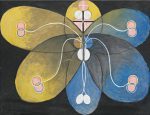Rick Wayne's Blog, page 63
November 18, 2018
Andrey Remnev, “The seller of lemonade”
Andrey Remnev, “The seller of lemonade”
Fuck Reality by Turkish painter Aykut Aydogdu
Fuck Reality by Turkish painter Aykut Aydogdu
November 17, 2018
(Art + Fiction) Book from the Sky
It used to be only hardcore bibliophiles had heard of books like the Voynich manuscript, the Codex Seraphinianus, or Carl Jung’s The Red Book.
In my research for FEAST OF SHADOWS last year, I discovered another biblioconundrum, Book From the Sky (c. 1987-91) by Chinese artist Xu Bing.
[image error]
Similar to the asemic writing of Luigi Serafini’s Codex, Bing’s book consists entirely several thousand gibberish glyphs, where that is roughly the number of commonly used characters in everyday written Chinese.
Bing constructed his glyphs using traditional radicals — the strokes that compose Chinese characters — but none of them have any meaning, despite that they look exactly like the real thing.
[image error]
Book from the Sky (also translatable as “Book from Heaven” or “Divine Writing”) was then printed in the style of the fine editions of the Song (960-1279) and Ming dynasties (1368-1644). [Note: Between the two was the Yuan dynasty, when China was ruled by the Mongols.]
Block printing was invented in China in the 8th century. Movable type was invented by a man called Bi Sheng between the years 1041 and 1048 — 400 years before Gutenberg, who introduced the idea to Europe.
(Gutenberg’s significant contribution to printing was the combination of existing elements with the screw-type press commonly used in agriculture, which made production more economical.)
[image error]
Xu Bing replicated the traditional method, carving his characters into pearwood and then arranging them in columns and printing them on long sheets. And yet, through four volumes, 604 pages, and 126 printed copies, none of it has any literal meaning. The meaning is the work itself.
This short video from Khan Academy talks a little about what that might be.
In 10,000 years, when biomechanical androids are excavating the ruins of man, will they puzzle over paper fragments of Book from the Sky as we puzzle over the Voynich manuscript, trying to discern its meaning?
[image error]
In fantasy and occult fiction, there is another kind of biblioconundrum: the evil book.
I have always been uncomfortable with the idea of an evil book, as if knowledge — even the false or fanatical — was ever bad. Even the “black arts,” if they existed, would be worth study if only to discover how to undo them.
In FEAST OF SHADOWS, I follow Lovecraft and others in having a Book of Shadows, a Necronomicon, which must be destroyed, but that symbolism always irked me — more so after I learned of Lovecraft’s racism and xenophobia.
His Necronomicon is penned by a “mad Arab,” and in that way, he was following the chauvinism of earlier centuries that viewed foreign religion, especially Islam, as heretical and demonic — not something to be understood, something to be destroyed. Something of which people should not even be aware. Something to purge from the libraries of the world.
It’s since become a standard trope in fantasy and horror, which is moderately disturbing — that we so readily accept there exist books that should be burned, or that knowledge corrupts.
I went ahead with it because I didn’t have an alternative.
Then I came up with one.
“It isn’t a book,” he objected. He touched his split lip gingerly with his tongue and grimaced. “A book is never an evil thing. Not in itself. All knowledge, even knowledge of the dark, is useful. Knowledge is nothing to be feared.” He sat on the grass cross-legged and coughed. Every part of him was dripping.
“So if it’s not a book, what is it?”
“Nebuchadnezzar transcribed what was whispered to him through the flames into a language of his own devising, which was why it was undecipherable.”
“Yes, everyone knows that.”
“But he was a fool. It’s not the language that matters. That’s why the ancients spoke of the power of the Word—logos in the Greek. It’s why Master Newton was obsessed with Biblical numerology. He understood that that’s simply how gods talk. They don’t make guttural noises, like animals. Divine language has a—a higher-order structure, something very difficult for us even to comprehend. You think the Nameless are so stupid as to send across a code that could be broken simply by writing it backwards, or in a foreign tongue?
“They had to transmit it as a text because in Nebuchadnezzar’s time that was the height of our art. The only way anyone here could record information was by scribbling symbols on pages. If they had it to do over, today they might send a sequence of DNA for us to grow in a lab. But it was never the script that mattered. What mattered were the second-order glyphs embedded in the information itself. You see?”
I didn’t.
His head and shoulders dropped in frustration. “Call it a code,” he said. “If you must. I suspect the glyphs can rearrange themselves in response to certain cues or conditions, and in so doing, they can also rearrange the text. It isn’t a book of spells and incantations, but it contains those things—many more than are displayed on its pages.
“When it was lost, when it sensed it was not being used, it became an antenna—of sorts. A transmitter you might say. The ancient ones knew the old king would try to trick them, so they made certain the book could be found, no matter where or how it was hidden, as long as their followers discovered the correct way to listen.
“It is also a well—or battery, if you prefer—from which endless darkness flows. It can be used to power spells, like the amulets of Zaragoza. The Necronomicon is all of those things and none of them. It is not anything so crude as a mechanism. It is closer to the emergent complexity of life than it is to a book or a machine. That is why it could never be copied. Many reproductions were made, but each was stillborn. For there is no one here who speaks the language of the gods.”
I scowled. “So why not send more?”
“The barter was for a text. A kingdom for a revelation. Theoretically . . . the glyphs could sustain a portal, if one could be opened, from which more like it could come across. However, if the seekers of the dark could achieve that, then there would be no need for anther book. They could simply summon the old ones themselves, or their armies, and return the world to bondage.” He studied my face, dour as it was. “Now do you see? It has but one purpose: to rekindle the ancient war. So tell me. Do you think that such a thing could be destroyed by beating on it with a hammer? Or shouting incantations at it?”
“No,” I said softly. “Probably not.”
“And that is how I know it endured. There are other signs—the great wars of the last century, the new viruses and plagues that emerged after, the inexorable warming of the earth. But it is always the simple explanation that reveals the truth. When Nebuchadnezzar called on the old ones for aid, the vanity of the king gave them that which they most desired. A chance. They would not have sent something across that could simply be burned or hacked or erased with a pencil. How else could it have endured for three thousand years?”
“Then how will we destroy it?”
He shook his head. “I do not know.
cover image by Nebezial
November 15, 2018
Adrift
In every medium, there’s at least one motif that is repeated compulsively.
With writers — in the West at least — it’s a story based on Greek mythology, often produced in the adolescence of their careers, as if there’s some unspoken rule that says you don’t get your big kid pants until you hack at something with the river Styx in it, or tell the million-millionth version of Orpheus & Eurydice.
For painters, there’s “the Ophelia.” Give a dude some paint and sooner or later he’ll drown a chick — figuratively speaking. (It’s less a thing with female artists. Go figure.)
I like Jeremy Lipking’s “Adrift” because it fucks with that. It’s conscious of “the Ophelia” tradition, but instead of depicting a woman who’s killed herself over a man, Lipking’s young subject seems to float in reverie, in celebration life — to me, anyway.
Maybe you see something different
(Opinion) An Extension of Charity
In my philosophy section at school, we had this rule, handed down from classes past, that said you couldn’t critique someone’s position until you first described it to their satisfaction.
It was presented as an extension of the Principle of Charity, which says that in any philosophical discussion, the interlocutors should interpret each other’s arguments in the most rational way possible using the strongest version of the argument presented. The only way to make sure you got it right is to ask.
First, the rule seemed tedious, like showing your work on a math test when you already knew the answer — or thought you did. But it saved so much backtracking, clarification, and acrimony that group discussions were not only shorter but more productive than if left free form, as on the internet.
It turns out that the simple effort of speaking your opponent’s argument aloud (and in your own words) triggers reflection. It reveals assumptions and gaps in understanding. Discussants who use this rule are far more likely to ask clarifying questions than those who simply listen and wait for their turn to speak.
Those who weren’t willing to put in that effort, we gradually learned, weren’t really interested in exchange as much as impressing people with their wit and/or beating them up with their intellect. Some folks feel they’re genuinely doing you a favor by pointing out how wrong you are.
I was one of those guys, by the way. Nor was I cured by philosophy class. I was a working professional in my 30s, where other people’s opinions of me mattered to my long-term success (as they do in any community), before things finally clicked: the only person competent to judge whether I had understood them was the person I was speaking to.
In practice, I’m human and don’t always act on this ideal, but it remains the standard by which I judge my behavior.
I was reminded recently that not everyone has had my experiences, which include that old philosophy section and its rule for productive discussion. Sadly, there’s no way to enforce it on the internet. All you can do is opt out.
November 14, 2018
(Fiction) A murder in broad daylight
29Sep
I recorded his instructions on my phone. I’d intended to transcribe them, if only for handy reference later, but work intervened and I spent the next few days on a murder. Not all of them are difficult and lengthy, just like not all petty theft is quick and easy. The difference is that we tend to let the petty shit go if there isn’t an easy culprit, whereas we generally try to solve a murder no matter how thorny it gets. In theory, anyway.
This particular murder happened in broad daylight and in full view of a convenience store security camera. The shooter, an accountant and mother of two, not only had no prior criminal record, she claimed not to know the man and to be completely unaware of her actions, and superficially, that appeared to be the case. But the reason the case came to me, the reason no one else wanted it, wasn’t the apparent lack of motive. It was because the victim had “runes,” vaguely like currency symbols, ritually burned into his chest and back, and because the slugs in the gun were made of several thousand dollars’ worth of solid gold—which is nearly twice as dense as lead and so has to be used at relatively close range.
You might assume that meant certain folks in the NYPD had an understanding of how the world really is and were handling it appropriately—by assigning the right people to the right cases. But you’d be wrong. Those in power don’t have a secret understanding of the world, although they’d prefer you to think that over the truth, which is that they don’t have any more of a clue than the rest of us. I wasn’t the NYPD’s secret resource. I was their secret embarrassment. Not that they were out to get me. A bureaucracy isn’t spontaneously goal-directed in that way. That takes leadership. What a bureaucracy is good at is reacting to things. I survived because I’d not given them any reason to react to me. My clearance rate was shit, but all that really does is keep you from getting a raise. Or a promotion. I never bothered to apply for either, which meant that as long as I didn’t call too much attention to myself, my colleagues would keep asking their lieutenants to send me the weird cases, the ones that looked damned likely to eat up time and bring a precinct’s numbers down, as this case was likely to.
For one, people don’t walk up to strangers and shoot them in the head for no reason, especially in broad daylight. The DA would want a motive. The fact that the insanity defense almost never works doesn’t stop people from trying. Our shooter was an accountant, for example, and the victim a banker. Was there a hidden connection, something she didn’t want us to know? And even if not, if she was just plain homicidal, everyone would want to know whether or not she’d killed before, which meant that despite the evidence—or rather because of it—someone would have to turn this woman’s life upside down and shake loose some answers.
Which is what I did. But for any of it to make sense, you need to understand something first. You need to understand that lycanthropy is hell, and not just to the person who contracts it. To their families as well. There’s no cure, but there are methods of suppression. Technically, it’s transmitted by bite. In reality, however, transmission is almost always sexual, since that’s when most biting occurs. The typical course starts when some guy or gal—it affects both equally—walks into a bar one night and feels a certain animal attraction to a stranger in the crowd, someone who seems nice, if a little skittish, like a shy animal. Later that evening, after a few drinks to loosen the inhibitions, the two of them end up having the best sex of their lives, or thereabouts. It’s wild and physical and ends suddenly with that guy or gal holding their hand to their neck and screaming “What the hell?” And the biter will be naked and huddled in the corner, apologizing over and over and saying they thought they could handle it, that they’d had their injection that month, that things just got out of hand.
At that point, an explanation may or may not be forthcoming—such as what will happen to them at the next full moon. To be fair, it’s a tough call. Dumping the full truth out of the blue is the surest way to scare someone off. Having already been bitten, it doesn’t take much to convince someone you’re just plain crazy and that they should never talk to you again, which is a risk since the best help at transition always comes from someone who’s gone through it before.
There used to be support groups, by the way. Used to be. People learned the hard way that it was a bad idea to put lycanthropes into packs.
Anyway, within a month, the bitten will wake up in a strange place, naked, with pigeon feathers caked to the blood on their cheeks, or rat meat stuck in their teeth. They’ll become quick to anger—but equally quick to forgive. In fact, they become intensely loyal to friends and family and lash out at anyone who offends someone close to them, sometimes physically. Every few weeks, they suffer uncontrollable bouts of sexual desire. A couple days after that, they black out completely. Sooner or later, someone in their life makes the connection between all of that and the phases of the moon—usually as a joke—and wheels begin turning.
The transformation isn’t nearly as dramatic as you’ve been led to believe, by the way. It’s more psychological than anything, but there are a handful of physical manifestations that are handy to know. Also, attacks on humans are relatively rare, same as with any wild animal, and usually only happen when the lycanthrope is desperate—if they’ve been ostracized from their “pack,” for example, which is to say abandoned their friends and family. Such attacks, when they happen, are frenzied and violent and the victim rarely survives.
It’s a helluva thing to watch your loved one go though that, month after month, year after year, gradually getting worse, waiting for the inevitable. You’d do anything to help them. Of course, you treat it rationally at first. You spend a fortune on doctors. On therapy. You get diagnoses ranging from food poisoning (common with lycanthropes) to dissociative disorder. But nothing seems to work. In fact, the pills and treatments only seem to make things worse. Only now you’re broke. Sooner or later, convinced you can’t be the only ones going through this, you start poking around online. The things you’ve witnessed maybe make you a little more open-minded than the average person, so you scroll through obscure internet forums and crackpot websites you never would’ve considered before. Someone suggests a witch.
It takes you a while, but you find one—maybe she even advertises—and she’s only too happy to help. She can make it all stop, she says. All you need to do is lease your soul to her. Sounds crazy, but you figure what the hell, how bad can it be? You’re not sure you believe any of that crap anyway. And she’s such a nice old lady. It’s only for a few months, maybe a little longer depending on the terms. So you sign the papers and the witch seals a silly old clay pot with wax and you walk away with a bag full of vials, a cocktail of rare herbs brewed with silver nitrate, and each new moon, at the ebb of their condition, when the effect is weakest, you make sure your loved one gets their injection, and yeah, maybe life seems a little duller, maybe your friends all tell you that you’re working too hard lately and you seem like a zombie, but there are no more episodes, your family is safe, so it’s worth it.
Then the deal runs out. You get your soul back, but you also run out of injections. You realize how dead you’ve felt—so numb that you didn’t even realize it. You try to get by on your own. One month goes by and things aren’t so bad. Two months, it gets a little worse. Three months, you’re back to the witch. Only now the terms are different. Now you have to lease your soul for longer. Maybe you sign right away, maybe you don’t. Maybe you go home and try to tough it out. Maybe you lock your loved one in the basement. Maybe they snap at you, literally. Maybe they get rough with one of the kids. Maybe in an inexplicable fury over a chew toy, they attack and kill the family pet. Maybe, as you’re scrubbing the blood off the kitchen floor, wondering what you’re going to tell your daughter when she gets home from school, you finally decide that you don’t have a choice. It’s just a year. You can do a year. And that will give you time to figure something out.
So you sign the paper, this time with a dot of your own blood, and the witch seals the urn and the light goes out of your eyes and you walk home in a daze with another bag full of vials. Another year goes by, and you never do find a different solution. Only now you know what’s coming, so you sign up again without any debate. You don’t even wait for the last contract to lapse. You’re numb and don’t want to remember what it felt like to be really alive, to experience again what you’ll have to sacrifice, so you go to the witch a few weeks early, and just as you expected, the terms of the deal have doubled. Like a payday loan, she gets a better deal the longer interest accrues.
Then one day, out of the blue, you wake up holding a smoking gun. People are screaming and running from you on the street. There’s a dead man at your feet, bleeding on the sidewalk. You don’t recognize him. You’ve never seen him before. The police arrive and order you to put the weapon down. You comply, shaking, and are arrested. You’re told there’s security video footage of yourself standing perfectly still for hours in front of that convenience store before suddenly walking up to the man and shooting him in the head at point blank range. You’re asked if you want a lawyer and you say yes, and while you’re waiting there alone in the interview room, you realize the color is back in your cheeks. You got your soul back. And the real terms of the deal you made become clear.
Of course, it took me a couple days to piece all that together. Any other detective armed with a warrant to search the family’ financial and medical history for hints of a motive certainly wouldn’t have recognized the signs—like a 32-year-old previously healthy man who suffers repeated bouts of food poisoning and who asks his doctor for tetanus and rabies shots.
The shooter was one Elise Landry. Divorced. Mother of two. Lives with her brother, who’s been sick for months and unable to hold a steady job. With the family savings spent on doctors and the rest, Ms. Landry had incurred a large debt. Her brother moved in, ostensibly to help with child care, around the same time as the booster shots. Life for the unusual family wasn’t easy, or so I gathered, but they were making it work. That is, until the shooting.
The good news, if you can call it that, is that the victim was a right genuine asshole, a banker at Goldman Sachs who got rich short-selling the insurance business—by all accounts, a real shark: greedy, intractable, and unloved. Still, on the video evidence alone, Ms. Landry’s conviction was all but guaranteed . . . that is, if the warrant hadn’t been improperly handled. It was a technical oversight, definitely—the video was seized a few hours before the warrant was actually issued—but it was enough. Any halfway decent defense attorney would get it thrown out. And with no motive, no prior record, no mention of the tape, and no eyewitnesses—thanks to the bumbling of the investigating officer, who failed to find any—Ms. Landry will likely end up pleading to probation and be home in a few weeks.
I’ll get my ass chewed over the procedural “mishaps,” not just from my boss but the DA as well, who I’m sure will make a special trip to see me, but as long as no one in the papers makes a stink about the case, it’ll wash off in a couple months—after I clear a few more cases that no one else could.
Meanwhile, I put the brother in touch with a certain good witch I know. Well, that’s not exactly true. I don’t really know her. I know of her. Suffice it to say, she doesn’t approve of me—or my methods. But she helps folks. Pretty young Haitian girl with rosebud dimples. Has a corner apartment in Harlem positively bursting with greenery. She’ll teach him how to mix his own cocktail and keep his condition in check by avoiding others of his kind. He might even be able to hold down a job. I hear many of them do. She’ll tell him to refrain from having sex until he’s in a committed relationship with someone who knows the truth and understands the risk. But he won’t. He’ll do good for a while, maybe even a year or two, but sooner or later he’ll get an itch he can’t scratch and the whole thing will start over with someone new.
I only saw Ms. Landry once. There was a meeting with the prosecutor, and we were waiting for her lawyer to arrive. I walked over and sat next to her and asked about her “contract.” We were within earshot of others, so I didn’t specify further. I didn’t need to. She seemed surprised—that anyone knew about that kind of thing, especially someone with the police. She wouldn’t say the witch’s name of course. She wouldn’t say anything actually, which was smart. She wanted to keep custody of her kids. No better way to lose them than by shooting a man and raving about werewolves and witches.
She wouldn’t say the name. But I saw her eyes when I did a moment later.
“Was it Granny?”
snippet from the third course of my forthcoming five-course occult mystery, FEAST OF SHADOWS.
death card by Molly Rose Purcell
November 13, 2018
November 12, 2018
(Art) The Trances of Hilma af Klint
The Guggenheim in New York is running a major retrospective on Hilma af Klint through early 2019. I discovered her only recently as I was doing research for my forthcoming occult mystery, FEAST OF SHADOWS.
In the book, one of the principal characters travels to India with Madame Helena Blavatsky, founder of the once-popular pseudo-religious Theosophical Society, to which Ms. Klint belonged for a time.
Theosophism was a kind of spiritualism, akin to Rosicrucianism, that taught one could contact spirits or similar otherworldly beings through trance and the techniques of mysticism. The Theosophical Society in particular was heavily influenced by Eastern philosophy, particularly the gurus of India, and attempted to bridge science and faith, the past and the future, which spoke to people who lived through the aftermath of the industrial revolution, when the old ways of life were still part of living memory. The Society became extremely popular in the latter decades of the 19th century and boasted thousands of “lodges” all over the world, despite several scandals and claims of fraud.
[image error]
It is the Guggenheim’s contention that Hilma af Klint, who was classically trained at the Swedish Royal Academy of Fine Arts and who worked as a landscape painter and botanical illustrator, should take the place of Kandinsky and Mondrian as the true founder of abstract art.
Her spiritual works, which she began in 1906, are clearly ahead of their time. But rather than prefiguring the great works of the abstract tradition, they strike me as something much closer to Outsider or Naive Art, with their concern for the intensely personal and psychological rather than the abstract representational — in particular, they remind me of the dream-drawings of psychologist Carl Jung and architect Paul Laffoley’s diagrams of consciousness.
[image error]
Unfortunately, Ms. Klint didn’t show her work in her lifetime. After her death in 1944, she left her paintings to her nephew on the stipulation that they not be displayed for at least another 20 years, which ensured they had no influence. Indeed, it wasn’t until 1980 that the art world even became aware of her nearly 200 abstract works.
However, regardless of where you place them in the story of art, they are definitely powerful. As artist R.H. Quaytman says in the Guggenheim piece:
“If you . . . didn’t know anything, you’d think these paintings were made ten or twenty years ago. You would not know how old they were. And what’s so thrilling about her work, I find, is how contemporary it feels.”















November 11, 2018
(Fiction) Stranger on a train
I sprayed bleach solution over everything, just to be safe, before wiping it all down and throwing it in the big rubbish bin behind the fried chicken chain that was closed for the night. I stashed the clothes in my bag. I’d have to dump them elsewhere. Not that I expected a manhunt or anything, but you can’t be too careful. I walked briskly down a quiet street in Queens and didn’t notice anything strange at all until the light on the sidewalk under my feet seemed to dim, as if someone had come up behind me without so much as a breath or shuffle. I spun. But the street was empty. A streetlight had failed just down the road. I kept on, and a few strides later, it happened again. I turned and saw a second lamp dim.
While I contemplated the odds of that, a third went dark, closer still, and I thought some faraway control mechanism had rebooted—or perhaps the lights were going through a maintenance cycle, or whatever, and in a few moments, all would be reliably lit again. I started walking as the fourth lamp went dark behind me, and then the fifth directly over my head. I looked up just in time to see its orange coils fade and leave me in a cone of shadow.
There was now a long gap on one side of the lit street, as if someone had cut the light like a cake and removed a rectangular slice from the air. I got that prickly sensation then, like when you go into the basement by yourself. You always know it isn’t rational, but you rush out all the same. And I did. I rushed. I started walking briskly. A couple times my stride turned to a brief trot. I made it up the stairs and through the stile and onto the platform just in time to see the train coming, which was good because I was completely alone there. I saw the headlights come around a bend in the tracks and I heard the screech of the wheels and I relaxed, even though I knew I was being silly. I boarded the middle car, which was empty. I took a seat and leaned my head back and shut my eyes. It was probably the only time in my life I was happy to be bathed in strong fluorescent light.
With my head back and eyes closed, I became vaguely aware that the ambient light around me had changed again. I opened my eyes. Not only was my car empty, it seemed there was also no one in the adjacent cars on either side, forward or back. The second car toward the rear was completely dark, as were all those that followed. I couldn’t see any illumination except the passing lights of the tunnel. It was weird. I thought for a second that somehow I’d stepped onto an out-of-service train by mistake.
When the lights in the next car back flickered and went dark, I sat up. A moment later, the lights over my head stuttered and I blinked—just as a sharp-dressed black man stepped through the rear door. He was maybe mid-60s and very gaunt. He wore an expensive charcoal suit, and wore it well. It had gray pinstripes and looked tailored. His necktie was very narrow, almost completely straight, and it matched the color of the suit. He wore a brimmed hat with a satin band and he walked with a fancy cane that tapped the floor with each step. I also heard the clink of coins in his pocket. His cuff links, belt, and shoes were all some kind of reptile hide—polished and shiny. He looked like a cross between a pimp and an undertaker.
“Miss,” he said to me, tipping his hat politely.
People don’t usually talk to each other on the train. But then, the two of us were the only ones within sight of each other. I assumed he came forward to escape whatever malfunction had blinded the rear cars. In the circumstances, it almost seemed ruder for him not to acknowledge me, and I responded with a polite, tight-lipped smile.
He sat across from me, one seat down, and settled with a sigh like he’d been walking for hours. The change in his pocket shifted noisily, and it sounded as if he carried all his money in coin. He took off his hat and set it on the seat next to him. He had hardly any hair left. What was there was gray-white, same as the band on his hat.
He caught me looking at his boots.
“Alligator hide,” he said.
He had a mouthful of gold and yellow teeth. He pulled a handkerchief from his coat pocket and wiped something off the toe of his boot.
“Under-appreciated, if you ask me. It’s tough. But flexible. And it gets downright soft over time.”
He had a throaty voice, not so much like a smoker as much as a man who’d spent his entire life shouting—an auctioneer perhaps, or a blues man.
“It’s certainly distinctive,” I said.
He nodded to me. “Just so.”
The shaft of his cane was solid black and lustrous, but I couldn’t tell if it was painted wood or obsidian. He held it loosely by the neck and rocked it back and forth. The tip was polished silver. The knob on top was a grinning skull.
The train slowed and he looked like he was going to get off. Then he stopped. He looked at me.
“This your stop?” he asked.
I shook my head. “Just a few more,” I said with another polite smile.
He sat back. “Then I’ll ride witcha.”
“Oh, you don’t have to do that.”
The train stopped and the doors opened, but my companion stayed put.
“I’m old fashioned,” he said in that throaty voice. “I know it ain’t popular. I know these days old men like me are supposed to let young ladies like yourself take care of themselves.” He shook his head. “But that’s not how I was raised.”
The movement of his jaw when he spoke pulled his skin taut over his skull, like there wasn’t much of anything underneath, like he was all bones and his skin was just as much a part of his clothes as the pinstripes.
I shrugged. “Suit yourself.”
The train started moving again and we sat in silence as it rocked back and forth over the tracks.
“Miss,” he said, leaning forward cautiously, “I hope you don’t mind me saying this, but are you okay?”
“Me?” I frowned. “I’m fine. Why?”
“You sure? You’re not in a spot of trouble, maybe?”
My face turned sour.
“It’s just,” he said, motioning to my bag on the seat next to me, “I couldn’t help but notice a ski mask there when I sat down just now.”
I closed the top by turning the handles over each other.
“Now, I know it wasn’t polite to look. But here you are on the late, late, late train.” He chuckled. Then he motioned to my head. “With a little bit of perspiration across your brow, and I thought—”
“I was out,” I said. “At a club. It was hot.”
He eyed my bag.
“It was a costume party.”
“Odd month for costumes.”
“Newest summer craze,” I said. “All the cool kids are doing it.”
I looked around the empty car and wondered how rude it would be if I changed seats.
He smiled in understanding, sat back, and crossed his legs, which revealed more of his fancy boots. The stitching formed skulls and flowers near the top.
“You’re not from around here, are you?” he asked.
“What makes you say that?”
“Your accent.” He twirled his cane in his right hand. “Very faint. If you was older, I’d say you’d been here awhile. But you young yet, which means you worked hard at it—putting the past behind you. How’d you do it? Lemme guess. Lots of American TV.”
“Deadly, but effective,” I joked. I turned my face toward the front of the train to signal the end of polite conversation.
“But just there under the surface.” He pointed the skull knob toward me and made wave shapes with it in the air. “There’s a little something else. Like how you say ‘rubbish.’”
I scowled again and thought back over the conversation. Had I said rubbish?
“Here they say ‘trash,’” he explained. “And it’s not ‘flat.’ It’s ‘apartment.’”
My brow stayed knit. I hadn’t said either of those words. Had I? “Um. Thanks. I’ll keep that in mind.”
“My guess, you’re from Hong Kong,” he said. Then he added, “What brings you to New York?”
Only he didn’t say it in English. He said it in perfect Hong Kong Cantonese.
I mean, perfect.
I stared. Call me racist, but there’s just something terribly incongruous about a black man speaking Chinese like a native. He had no accent. None.
“School,” I answered. I glanced to the route map above the car doors and confirmed there were just two more stops.
We were quiet a few more moments as the train slowed and the next station was announced. I wondered if I should hop off. He must have saw it on my face because he sat back and relaxed considerably.
“Oh, don’t mind me. I didn’t mean nothing by it.”
I watched the doors open.
I watched them close again.
The train started moving, and we rocked with it for another minute or so.
“It’s just really something,” he said softly. “After all these years.”
I didn’t look at him. It was way late and I’d been rushing on my feet for hours. I was tired and I just wanted to get home.
“You should know I ain’t never met the man, ’cept once in passing. Like this.” He moved the cane back and forth between us.
I had no idea who he was talking about. I got up and stood by the door. It didn’t seem like he wanted to hurt me. It seemed like he was just old and lonely. But I was ready to bolt just in case.
He brushed lint off his suit pants like he was annoyed. He replaced his hat on his head. He took out his handkerchief again and polished the silver skull at the top of his cane. Then he stood and faced me.
He seemed taller then, like the tip of his hat was brushing the ceiling. He brandished the cane. “But here he thinks he can come into my house . . . And take what’s mine.”
The announcement for the next stop came over the speakers and I felt the train slowing. I gripped the bar by the door with two hands. The lights in the car flickered. The ones in the rear cars all returned and suddenly everything was a little brighter. Then it was too bright.
“You tell him,” he said to me. “You tell him when you see him that I’m ready. And don’t you think for one damned second that that thing”—he jabbed the tip of his cane at my side—“will protect you.”
I flinched, but it was unnecessary. The rounded silver tip stopped dead at my skin as if striking the walls of the train. I thought—but couldn’t be sure—that I even heard the clink of metal.
I was freaking as the train squeaked to a stop. I was practically bouncing up and down for the doors to open. When they finally did, I made right for the stairs. I only glanced back once.
The old man had removed his hat with one hand. He swung it wide and bowed formally as he called after me.
“See you real soon, Cerise.”
opening to “Curse of the Red Dagger,” the second course of my forthcoming five-course occult mystery, FEAST OF SHADOWS.
cover image by Miranda Meeks



